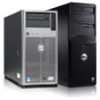Dell PowerEdge T605 Hardware Owner's Manual (PDF) - Page 217
Self-Monitoring Analysis and Reporting Technology. Allows hard drives - motherboard
 |
View all Dell PowerEdge T605 manuals
Add to My Manuals
Save this manual to your list of manuals |
Page 217 highlights
read-only file - A read-only file is one that you are prohibited from editing or deleting. ROM - Read-only memory. Your system contains some programs essential to its operation in ROM code. A ROM chip retains its contents even after you turn off your system. Examples of code in ROM include the program that initiates your system's boot routine and the POST. ROMB - RAID on motherboard. rpm - Revolutions per minute. RTC - Real-time clock. SAS - Serial-attached SCSI. SATA - Serial Advanced Technology Attachment. A standard interface between the system board and storage devices. SCSI - Small computer system interface. An I/O bus interface with faster data transmission rates than standard ports. SDRAM - Synchronous dynamic random-access memory. sec - Second(s). serial port - An I/O port used most often to connect a modem to your system. You can usually identify a serial port on your system by its 9-pin connector. service tag - A bar code label on the system used to identify it when you call Dell for technical support. simple disk volume - The volume of free space on a single dynamic, physical disk. SMART - Self-Monitoring Analysis and Reporting Technology. Allows hard drives to report errors and failures to the system BIOS and then display an error message on the screen. SMP - Symmetric multiprocessing. Used to describe a system that has two or more processors connected via a high-bandwidth link and managed by an operating system, where each processor has equal access to I/O devices. Glossary 217















